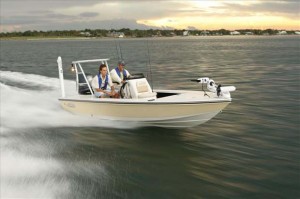We are officially in boat show season and as a result thousands of people will be searching for their perfect vessel, myself included.
By Grant Gisondo / Part One
My needs have changed
[dropcap]M[/dropcap]y decision to sell my 28-foot center console was not an easy one. It has served me faithfully for many years. It is outfitted exactly the way it should be and no expense has been spared. The bottom line is that my needs have changed. My boat is no longer meeting my family needs or mine when to comes to fishing. Buying a new boat and selling an old one are decisions that need to be approached cautiously. If you currently own a boat and are thinking of upgrading, like I am, careful analysis of all current situations are important. If you’re just buying a boat, and not selling an old one, you still need to approach buying with due caution because it has a significant financial impact.

A boat show is a great way to source out your boating needs. The Ft. Lauderdale Boat Show has it all.
Buying a boat
Buying a new or used boat should be considered as a business decision. If you are anything like me, you’ll think of a boat in terms of how you will fish it, cruise in it with your family and friends, or spend the weekend in the Bahamas, and so on. What you’re thinking about with regard to your decision making is exactly what every boat seller or manufacture wants you to think about. The boating industry spends millions of dollars advertising how to “relax” on their new models. They’re selling you a lifestyle. You may “relax” on your boat quite a bit, but there is absolutely nothing relaxing about buying a boat. It is a business transaction and sometimes there’s lots of negotiating.
Typically, a buyer is trying to spend as little money as possible and the seller is trying to get as much money as possible. You should be fully aware that the seller is not your friend, not your buddy and not your ally. You have a direct adverse interest to the person you are buying your boat from. It is imperative that you understand that.
If you can spend $40,000.00 on a boat, the seller will try to get you to spend $45,0000.00. If the seller prices their boat at $60,000.00, I can guarantee that is not the number the boat will sell for. Sellers understand that; it’s much like cars, people do not purchase boats for the asking price. there are industry buzz words like priced to sell,firm, new boat on order and so on. These phrases are meant to lead the buyer to believe that this is a one in a million deal and cannot be passed up.
 Buying a used boat is always negotiable. Every boat for sale is “priced to sell” otherwise it wouldn’t be for sale. My favorite of the aforementioned of the buzz words is “firm.” It’s a tell-tale sign that the seller is not really ready to sell the boat, but wants to test the market. Typically, these boats are listed for an OK price and usually right in the middle of similar boats for sale.
Buying a used boat is always negotiable. Every boat for sale is “priced to sell” otherwise it wouldn’t be for sale. My favorite of the aforementioned of the buzz words is “firm.” It’s a tell-tale sign that the seller is not really ready to sell the boat, but wants to test the market. Typically, these boats are listed for an OK price and usually right in the middle of similar boats for sale.
I find that in the market there are two ways sellers list their boats. One, the seller researched all the comparable boats and priced their boat accordingly. This is a good seller because the emotions are left at the dock and they are looking only at the numbers. Ideally, this is the private seller you want to be buying from – they’re educated, reasonable and practical thinkers.
How sellers list their boats
The other type of seller is the one to be wary of – he’s a seller that doesn’t know what his or her boat is actually worth, but is selling on the emotional basis of what he or she believes its worth because of the TLC they’ve put into the boat along with memories of boating. Typically, if you purchase a boat from the latter type seller you’ll overpay. This kind of seller believes a $20,000 boat is worth $30,000 because, for example, their child caught their first fish on it, first kissed his wife to be or caught a world record tarpon on it. Those memories are useless to the buyer, but carry weight for the seller. It’s is very hard to negotiate away a memory from a seller that is basing a business decision on memories.
Keep your eyes peeled for Part Two later this week [Buying a Boat from a Broker, and The Six Step Process]


